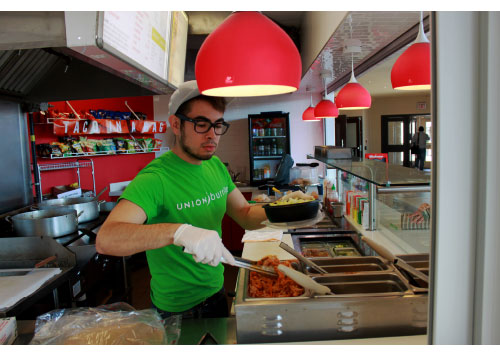The work-study struggle
Being a student and finding work is not easy, and juggling the two is even harder. The struggle to earn good grades and make a decent dollar is something many college students face.
“Trying to find work that fits with their schedule is a big issue for students,” said Laurie Jackson, director of financial aid and awards at Sheridan. “We are a college town and the places that people would tend to go to find work are competing with every other student who is here. Sheridan alone has 20,000 students, so there is a lot of competition.”
Jackson sees students come for financial aid and looking for work all the time, and Sheridan has a few ways to help its students. “We have a work study program here at Sheridan where we employ from 200 to maybe 300 students, who work either part time or full time,” said Jackson. “Finance hires students, the library hires student peer mentors, the student union, there are places on campus where students can work and fit students’ schedules.”
MORE RELATED TO THIS STORY
- Jill of all trades: from athlete to educator
- The wide wage gap between men and women
- Library assists first-year students
Departments tend to hire semester to semester and jobs are posted on Jobs.sheridan regularly, according to Jackson.
Jackson encourages students to have a plan before starting work and going to school at the same time, and to ask themselves if working and going to school is something they can do.
“Know your financial situation. You need to ask yourself ‘Can I afford to go to school?’ And if you can’t, what types of support do you need?” said Jackson. “Maybe you need to ask yourself if you are even financially ready for school.”
Outside of Sheridan, there are many stores looking for part-time workers at this time of year. One of them is The Bay, where about 60 students are hired seasonally, according to Gerry Duraisamy, the store’s human resources administrator.
“The bulk of our students are seasonal hires, individuals who work from October to the end of December,” said Duraisamy.
Students tend to work weekends and The Bay tries its best to accommodate students’ schedules within the “complex industry of retail,” said Duraisamy.
“It is difficult to work with students. They have limited availability. We would prefer people who can work all weeknights Monday to Saturday full, but most students can only work one or two shifts within the week,” said Duraisamy. “Sometimes students are unreliable. School is important and comes first for them, so usually if there is an exam or test they will call in sick or just not show.”
One way The Bay helps students work around school is through flexible scheduling, where students are mixed and matched through the week depending on what days they can work to fill out the week.
“School is the one time we do get to use flexible scheduling, which does make it nice to have students,” said Duraisamy. “Basically we have students who can only work certain shifts during the week, so someone who can’t work Tuesday nights will work Monday night and someone else will work a Tuesday night who can’t work Mondays and so on.”
Adolfo Moreno, 23, a first-year Advertising and Marketing Communications Management student, works at Union Burrito and thinks students can work and go to school if they really try.
“It’s actually a lot of fun. Today I’m gonna finish my shift at 2:30 and h ave to rush to my locker to get changed and get to my 3 o’clock class. Students need to just try. If you can handle a bunch of assignments then you shouldn’t have issues working at the same time,” said Moreno. “I have had to be more organized with my school assignments but I think that really helps me with time management in the long run.”
Jean-Luc Amyotte, 19, a first-year Criminology and Psychology student at University of Toronto, believes working while at school can be both beneficial and stressful.
“Being employed has been beneficial in many ways, like learning to multi-task, which is a huge part of getting into the rhythm of university life and just having extra spending money for school materials and snacking food.”
Sarah Vasconcelos, 21, fourth-year Marketing student at Humber College, also thinks working and going to school can be beneficial to your personal growth.
“I’m put in a position where time management is very important. I need to prioritize what needs to get done and when.”
Amyotte had to give up his first job in high school because his grades had fallen and time between classes and extracurricular programs made it difficult. But when it came to university, he had a different plan.
“I started working at Target in February, 2014 and started school that September. I challenged myself to attend school and go to work at the same time,” said Amyotte.
“I enjoy the freedom of having money to spend on yourself and family, the option to multi-task and remain busy. It also looks good on a resume after you received your degree or diploma because it shows the employer that you can manage a stressful environment at such a hectic part in your life.”
Vasconcelos knows working is sometimes required to go to school and shares her advice on how to make things easier.
“Don’t be afraid to take a smaller course load; four classes instead of five or even part-time. It’s not worth risking your health or finances for,” said Vasconcelos. “It may take more time but you’re working towards an end goal that will enrich your resume and chances in the job market.”
Amyotte shares his own advice he has quickly learned through his first year at university and working.
“Keep working, never quit your job and certainly never quit school, but try to limit your availability to a certain number of hours per week in order to allow sufficient time for school,” he said.
“That is where I messed up. I am working on average 32 hours a week while being a full-time student and only after one semester, I am planning on lowering my hours or perhaps even finding another job suitable to my needs.”





